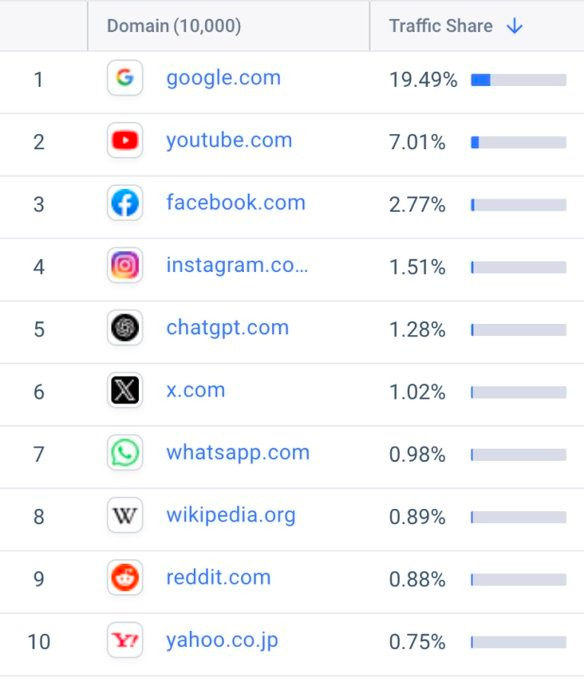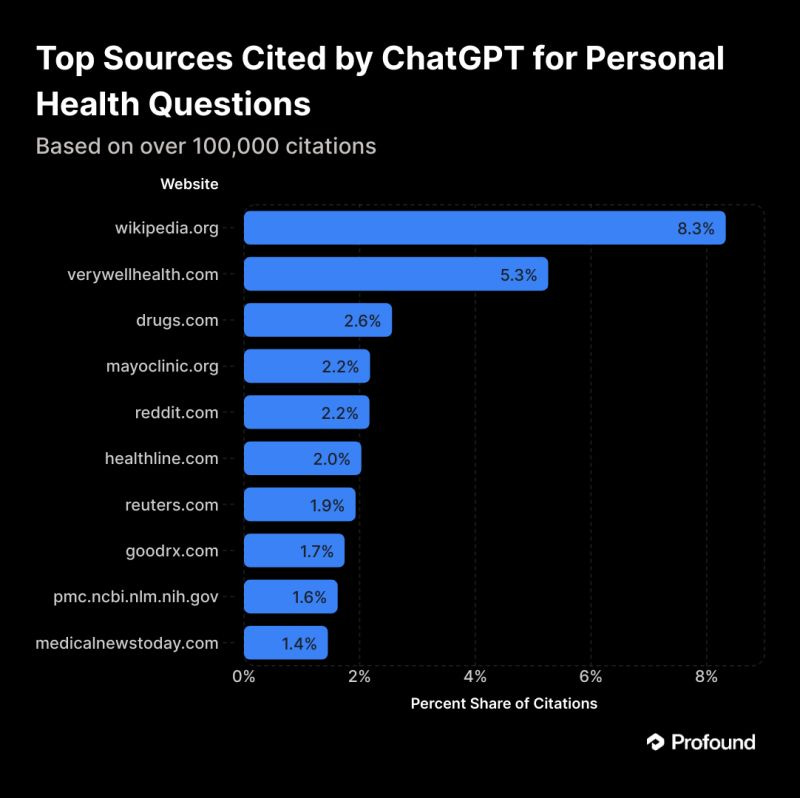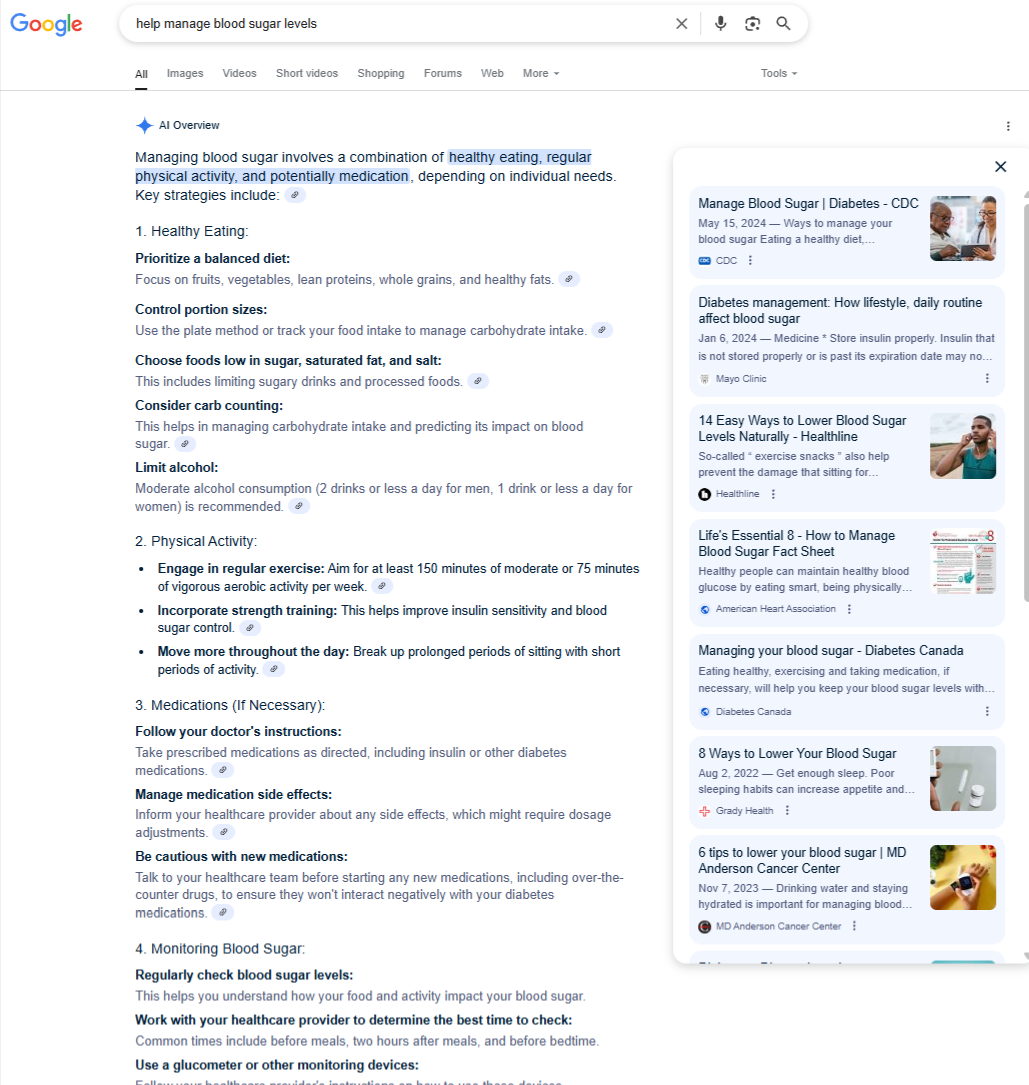From "Dr. Google" to Dr. ChatGPT: Why Healthcare Needs to Win the Trust Race
This article started with a single LinkedIn discussion about a fascinating, yet unsettling, topic: the top sources ChatGPT cites for personal health questions.
A recent LinkedIn conversation got me thinking. The topic? Which sources ChatGPT trusts most for health advice. It's a critical question, because as of 2025, ChatGPT is firmly lodged as a top-5 global website, meaning millions are turning to it daily.
The top 10 websites worldwide by total visits in May 2025 are unchanged from last month. ChatGPT secures its 5th place position.
When I first began focusing on the "patients turning to Google" problem years ago, the challenge was clear. Today, with the dominance of AI assistants like ChatGPT, Perplexity, and Gemini, the challenge has evolved into a full-blown crisis of trust for healthcare providers.
Reddit is tied with Mayo Clinic at 2.2%. Think about that for a second: random Reddit comments are being cited as frequently as one of the world's most prestigious medical institutions…If you needed serious medical advice, would you rather that information came from the Mayo Clinic, or from the Reddit thread that happened to be well-written enough for ChatGPT to cite? Source
We are no longer just competing with search engines; we are competing with the instant, conversational answers of AI. This reality demands more than just a better website. It demands a smarter, more empathetic strategy. It requires a deep, data-driven understanding of patient needs—the very foundation of Customer Relationship Management (CRM).
The role and importance of CRM and customers engagement strategies
The core issue is that a failure in patient-centric strategy (a CRM problem) is creating a content vacuum, which in turn allows misinformation (often amplified by AI) to thrive. The solution is to use CRM fundamentals to fix the core problem.
In the evolving landscape of pharmaceutical and consumer health brands, CRM is no longer just a retention engine—it is a core driver of omnichannel growth. For organizations managing high-value, trust-driven products like infant formulas, clinical nutrition, or hydration supplements, the ability to activate CRM across platforms like Amazon, Walmart, Instacart, and Google’s Performance Max (PMax) is now a competitive necessity.
Yet, two major threats are emerging:
AI-generated answers (e.g., ChatGPT, Gemini) are shaping consumer health decisions. Brands not optimized for Large Language Models (LLMs) risk losing visibility and influence.
Advertising platforms require stronger first-party data signals to train their AI models. Without a CRM strategy feeding clean, structured data, media spend will underperform or plateau.
To scale efficiently, CRM must become the central nervous system of your digital commerce. I wrote an article stressing this point for retailers in my personal blog, now I want to take a chance to address it for healthcare professionals :
Optimize for AI Discovery via LLMs (ChatGPT, Gemini)
Use CRM insights to power content that LLMs can index and surface in health-related queries.
Structure content based on top CRM questions and support interactions.
Implement schema markup, plain language answers, and FAQ structures across content hubs
Turn CRM into a Consumer Intelligence Platform
Use Customer Data Platforms (CDPs) like Salesforce to unify behavioral, transactional, and lifecycle data into usable segments.
Segment by life stage (e.g., new parents, chronic condition management, senior wellness), engagement levels, and purchase channels (Amazon, Instacart, DTC).
These insights drive campaign eligibility, personalized messaging, and smarter product recommendations.
Align CRM with HCP Touchpoints to Drive Retail Action
Track healthcare professional engagement and sampling programs.
Connect physician or clinic-driven awareness to consumer follow-up messaging.
Use CRM to trigger local campaign flows such as “Recommended by providers in your area.”
Integrate eComm Feedback Loops into CRM Profiles
Enrich CRM with reviews, return behavior, and service feedback.
Adjust recommendations or suppress problematic SKUs for users reporting poor satisfaction.
The Trust Gap: Why Patients Look Elsewhere for Answers
Why do patients so often bypass the very organizations meant to care for them? The answer lies in a profound disconnect between what patients need and what healthcare platforms deliver. It begins with a broken user experience. When a person is anxious about a health concern, the last thing they want is a complex, jargon-filled website that’s difficult to navigate. They seek simplicity and speed, but are met with friction and frustration.
This is compounded by a lack of foresight into the patient's journey. Healthcare platforms rarely consider the full spectrum of a user's questions and interactions, leaving gaping holes in the information trail.
While industry regulations play a protective role, they cannot be blamed for the core failure: an inability to listen.
The modern patient wants clear, non-technical language and the relatable context that user-generated content often provides. By not delivering this, the healthcare industry itself is pushing users toward the very communities it cautions against.
The Authority Signal: Why Google’s Responsible AI Offers a Hopeful Path Forward
Despite the significant challenges posed by digital misinformation, there are clear signs of hope. For years, search engines like Google have been refining how they handle sensitive "Your Money or Your Life" (YMYL) queries, and we are now seeing this responsible approach extend into the age of AI. As the provided image for the query "help manage blood sugar levels" shows, the AI Overview doesn't turn to community forums for answers. Instead, it responsibly synthesizes information from the world's most trusted health authorities, such as the CDC, Mayo Clinic, and the American Heart Association.
While the technology isn't perfect, this serves as a powerful proof of concept: it is possible to leverage AI to prioritize expertise and deliver safe, reliable answers at scale. This shouldn't make healthcare organizations complacent; rather, it should inspire them. If a tech giant can build a framework to elevate authoritative content, then individual providers, armed with a deep understanding of their patients through CRM, can and must do the same to build the ultimate source of truth and win back patient trust for good.




